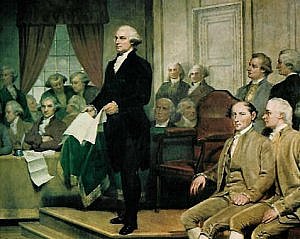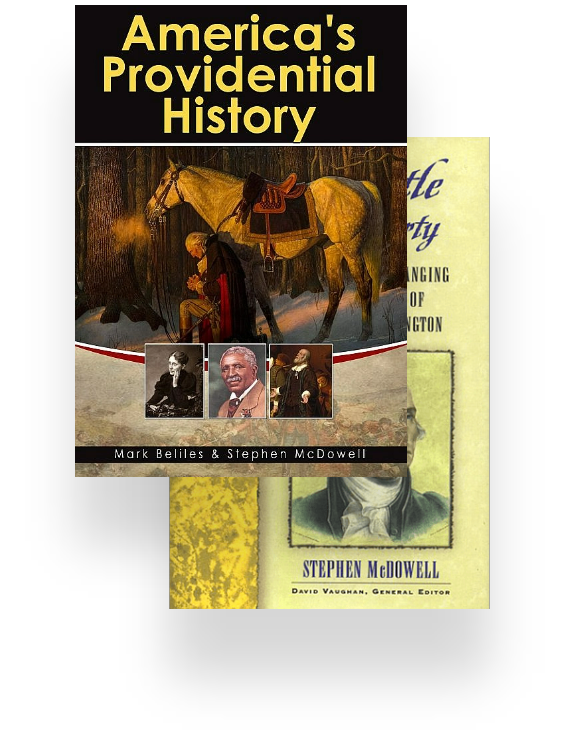PF UNIVERSITY

The Founders of America had a providential view of history. In an address to the United States Congress in 1866, historian George Bancroft reflected this predominant philosophy when he said: “that God rules in the affairs of men is as certain as any truth of physical science.”[1]
American history is filled with instances of God’s supernatural intervention in important events. In the colonial era this included, among myriads of examples, Pocahontas providentially saving John Smith’s life, God sending Squanto to help the Pilgrims survive in their new home, William Penn receiving a charter – “through my God,” he said – to start a new colony, the miraculous defeat of the French fleet sent to destroy America in 1746, the great outpouring of God’s Spirit during the First Great Awakening, and God preserving Washington’s life during the French and Indian War. God’s Providence continued during the American Revolution and was acknowledged by all.
In reviewing the events of the first few years of the Revolutionary War, George Washington wrote in 1778, “The hand of Providence has been so conspicuous in all of this, that he must be worse than an infidel that lacks faith, and more than wicked, that has not gratitude enough to acknowledge his obligations.”[2] A conspicuous providential event that occurred two years later was the discovery of Benedict’s Arnold’s treason.
Major General Arnold has gone to the Enemy. He had had an interview with Major Andre, Adjutant Genl. of the British Army, and had put into his possession a state of our Army; of the Garrison at this post;…By a most providential interposition, Major Andre was taken in returning to New York with all these papers in General Arnold’s hand writing, who hearing of the matter kept it secret, left his Quarters immediately under pretence of going over to West point on Monday forenoon,…then pushed down the river in the barge, which was not discovered till I had returned from West point in the Afternoon.[4]
After André had met with Arnold and obtained the information, he was traveling back to New York in civilian dress to deliver it to his superiors. On the road, he encountered a few American militiamen whom he mistook for loyalists. He talked too freely, which aroused their suspicion. They searched André and found the incriminating papers in his stockings. “They were offered,” Washington wrote, “a large sum of money for his release, and as many goods as they would demand, but without effect. Their conduct gives them a just claim to the thanks of their country.”[5] The militiamen took André to the nearest military outpost, where the officer, not realizing Arnold’s participation in the plot, notified him of André’s capture. Thus warned, Arnold fled to British lines. Had his treasonous plans not been found out, West Point would have fallen into British hands, which would have been a blow too great for the Continentals to sustain.
Washington wrote to Lt. Col. John Laurens, “In no instance since the commencement of the War has the interposition of Providence appeared more conspicuous than in the rescue of the Post and Garrison of West point from Arnolds villainous perfidy.”[6] In his general orders for September 26, 1780, Washington declared: “Treason of the blackest dye was yesterday discovered! General Arnold who commanded at Westpoint, lost to every sentiment of honor, of public and private obligation, was about to deliver up that important Post into the hands of the enemy. Such an event must have given the American cause a deadly wound if not a fatal stab. Happily the treason has been timely discovered to prevent the fatal misfortune. The providential train of circumstances which led to it affords the most convincing proof that the Liberties of America are the object of divine Protection.”[7]
The Continental Congress also attributed the discovery of the treason to “Almighty God, the Father of all mercies.” They “recommended to the several states to set apart Thursday, the seventh day of December next, to be observed as a day of public thanksgiving and prayer” where the people should praise and thank God, ask Him to pardon their sins and to smile upon their endeavors, petition Him for peace and blessings, and “to cause the knowledge of Christianity to spread over all the earth.”[8]
This providential occurrence was typical of many similar events. God moved miraculously to direct history to further His purpose to bring liberty to mankind. The biblically minded Americans recognized the hand of God and officially gave thanks to Him.
Within three years of the discovery of Arnold’s plot, England officially recognized the independence of the United States of America when they signed the Treaty of Paris on September 3, 1783, which appropriately begins with the words: “In the name of the Most Holy and Undivided Trinity. It having pleased the Divine Providence…”[9] Most Americans were in agreement that God directed the events leading to the birth of America and a new era of liberty in the world.
Four years later representatives of the states formulated the United States Constitution, which went into effect in 1789 after it was ratified by the states. God’s providence was at work in this world-changing event as well. The Framers of the Constitution declared that the forming of that document was a miracle of God. Writing to Thomas Jefferson just a few weeks after the Convention, the Father of the Constitution James Madison said: “It is impossible to conceive the degree of concord which ultimately prevailed, as less than a miracle.”[10] Later Madison wrote: “It is impossible for the man of pious reflection not to perceive in it [the Constitutional Convention] a finger of that Almighty hand.”[11] Even the non-Christian Benjamin Franklin wrote:
Our General Convention … when it formed the new Federal Constitution, [was] … influenced, guided, and governed by that omnipotent and beneficent Ruler in whom all…live, and move, and have their being.[12]

Perhaps the greatest affirmation of this came from the most influential of all the Framers of the Constitution — George Washington. In a letter to his good friend, Governor Jonathan Trumbull of Connecticut, he wrote that the “adoption of the proposed General Government” disposed him to be of the opinion “that miracles have not ceased.” For, he said, one could “trace the finger of Providence through those dark and mysterious events, which first induced the States to appoint a general Convention and then led them one after another…into an adoption of the system recommended by that general Convention.”[13]
Just prior to the official ratification of the Constitution by the ninth state, New Hampshire, George Washington summed up the whole era by again referring to the hand of God:
Should everything proceed as we anticipate, it will be so much beyond anything we had a right to imagine or expect 18 months ago that it will demonstrate the finger of Providence in human affairs greater than any event in history.[14]
America’s Founders, both Christian and non-Christian, had a providential view of history. They believed, in the words of Franklin when he called the Constitutional Convention to prayer in the summer of 1787,
that God governs in the affairs of man. And if a sparrow cannot fall to the ground without his notice, is it probable that an empire can rise without His aid? We have been assured, Sir, in the Sacred Writings that “except the Lord build the house, they labor in vain that build it (Psalm 127:1).” I firmly believe this, and I also believe that without His concurring aid we shall succeed in this political building no better than the builders of Babel.[15]
God gave birth to America to advance His liberty among the nations. The Founders of this exceptional nation acknowledged God’s hand and gave Him thanks for our growth and success. We have advanced due to His goodness and purposes, not our wisdom and abilities. If we reject Him and fail to rely upon Him, this great experiment in liberty will become like the ruins of Babel. Let us therefore follow the advice of the President of the Continental Congress and famous Declaration signatory, John Hancock:
Let us humbly commit our righteous cause to the great Lord of the Universe….Let us joyfully leave our concerns in the hands of Him who raises up and puts down the empires and kingdoms of the earth as He pleases.[16]
___
Stephen McDowell, co-founder and President of the Providence Foundation, has trained people from 100 countries to apply Biblical truth in all spheres of life. He has consulted with government officials, assisted in writing political documents and starting political parties, and aided in starting Christian schools and Biblical worldview training centers. He has authored and co-authored over 30 books, videos, and training courses including Liberating the Nations and America’s Providential History. Stephen’s books and writings have been translated into 18 languages and distributed to millions of people.
[1] George Bancroft, Memorial Address on the Life and Character of Abraham Lincoln, Delivered at the Request of Both Houses of the Congress of America, Before Them in the House of Representatives at Washington, on the 12th of February, 1866, Washington: Government Printing Office, 1866, pp. 3-4.
[2] The Writings of George Washington from the Original Manuscript Sources, 1745–1799. Edited by John C. Fitzpatrick. 39 volumes. Washington DC: U.S. Government Printing Office, 1931, 12:343.
[3] Washington to the president of Congress, October 13, 1780, The Writings of Washington, 20:173.
[4] Washington to William Heath, September 26, 1780, The Writings of Washington, 20:88-89.
[5] Washington to the president of Congress, September 26, 1780, The Writings of Washington, 20:92.
[6] Washington to John Laurens, October 13, 1780, The Writings of Washington, 20:173
[7] The Writings of Washington, 20:95.
[8] Journals of Congress, October 18, 1780, in Mark Beliles and Stephen McDowell, America’s Providential History, Charlottesville: Vir.: Providence Foundation, 1991, p. 165.
[9] Treaty with Great Britain, American Historical Documents, 1000-1904, The Harvard Classics, Danbury, Conn.: Grolier Enterprises Corp., 1910 (1987), p. 174.
[10] Robert A Rutland, ed., The Papers of James Madison, University of Chicago Press, 1962, 10:208.
[11] Cleon Skousen, The Making of America, p. 5.
[12] Albert Henry Smyth, editor, Writings of Benjamin Franklin, Macmillan Co., 1905-07, 9:702.
[13] The Writings of George Washington, 29:525.
[14] George Bancroft, History of the United States of America, D. Appleton and Co., 1891, 6:414.
[15] James Madison’s Notes of Debates in the Federal Convention of 1787, New York: W.W. Norton & Co., 1987, pp. 209-210.
[16] John Hancock, “Oration, Delivered at Boston, March 5, 1774,” in Hezekiah Niles, Principles and Acts of the Revolution in America, New York: A.S. Barnes & Co., 1876, p. 42.
PF UNIVERSITY
The courses offered by the Providence Foundation Biblical Worldview University (BWU) are designed to equip leaders of education, business, and politics to transform their culture for Christ, and to train all citizens how to disciple nations.
DONATE
Support Providence Foundation today! Choose Minuteman, Patriot, or Founder level and make a monthly impact. Or select ‘Custom’ to contribute now. Join us in shaping our nation’s future
